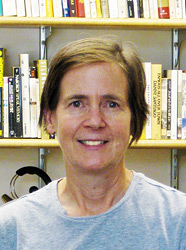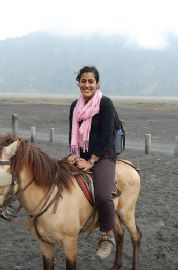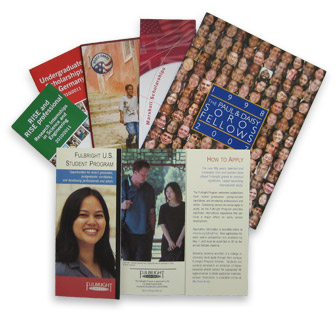Rewarding Hard Work
June 30, 2009
Earlier in the decade, DePauw's faculty members recognized an opportunity. The University's academics ranked among the top baccalaureate colleges in the country, but DePauw students weren't winning nationally competitive scholarships at the same rate as other competitive institutions. As it turned out, there was a very good reason: many of DePauw's students simply weren't applying for them.
 "One of our students, now at Harvard Law School, was asked by his advisor why he didn't apply for a Truman Scholarship," recalls Marion "Marnie" K. McInnes (left), dean of academic life at DePauw. "He'd planned to do public service law and had spent most of his life doing service work. He would have been an outstanding candidate for the scholarship, but he'd never heard of it. Stories like those reminded us that we needed to get the word out to students about the existence of these scholarships."
"One of our students, now at Harvard Law School, was asked by his advisor why he didn't apply for a Truman Scholarship," recalls Marion "Marnie" K. McInnes (left), dean of academic life at DePauw. "He'd planned to do public service law and had spent most of his life doing service work. He would have been an outstanding candidate for the scholarship, but he'd never heard of it. Stories like those reminded us that we needed to get the word out to students about the existence of these scholarships."
Seeing the awards as low-hanging fruit for DePauw's talented student body, the University has steadily increased the resources dedicated to advising applicants. In the case of the Fulbright Award, DePauw went from no applicants in 2002 to 31 applicants and six winners in 2009, in large part due to the efforts of program advisor Douglas E. Harms, professor of computer science and a former Fulbright Scholar.
For three — soon to be four — years running, The Chronicle for Higher Education has listed the University as one of the Top Producers of Fulbright Awards for U.S. Students. Among the list of DePauw's recent scholarship winners, three DePauw students won Barry M. Goldwater Scholarships in 2008, and four received Benjamin A. Gilman International Scholarships in 2008-09 alone.
The University's efforts to improve student awareness of the awards culminated this year with creation of the Office of Graduate Fellowships, directed by McInnes. Kathleen S. Knaul, director of the Center for International and Experiential Education and assistant dean of academic affairs, and Amy A. Welch, associate director of the Honor Scholar program, work with McInnes to recruit and advise applicants as well as strengthen fellowship advising across the University.
As colleges across the country have adopted similar, proactive advising strategies, scholarship applicants are increasingly in need of the institutional support that DePauw offers.
 "We used to think that the best students could write the application essays and win simply based on their accomplishments, but now we see that's just not true," McInnes says. "Even the best students need guidance and feedback on the application process. By going to [National Association of Fellowship Advisors] meetings and talking to colleagues from Pomona College and Wellesley College, it's clear that it takes an enormous amount of preparation for a candidate just to be competitive."
"We used to think that the best students could write the application essays and win simply based on their accomplishments, but now we see that's just not true," McInnes says. "Even the best students need guidance and feedback on the application process. By going to [National Association of Fellowship Advisors] meetings and talking to colleagues from Pomona College and Wellesley College, it's clear that it takes an enormous amount of preparation for a candidate just to be competitive."
Many awards, such as the Fulbright or Rhodes scholarships, take into consideration how connected are a student's academic and personal interests. For example, a strong candidate might be one who is studying public health and has also volunteered at a free health clinic in a developing country. These types of interrelated pursuits can be realized while in college, and are readily available at DePauw through study abroad opportunities such as Winter Term in Service acting as natural extensions of a student's academic interests outside the classroom. In fact, all of DePauw's 2008-09 nationally competitive scholarship winners and 16 of 19 students selected for Teach for America studied abroad.
DePauw students have traditionally been able to pursue one-on-one summer research with professors as well, further improving their chances for awards. This summer, dozens of students have remained on campus or have traveled with professors for research in nearly every discipline. Fulbright winner Nishita Trisal '07 (above right), who taught for a year in Indonesia, commented, "Being at a smaller school, we can interact with our professors in a much more personal way and at a younger age.Freshmen and sophomores really have the opportunity to do summer research and develop relationships with people who are willing to invest in them."

The most difficult part of the application process may be drafting a personal statement that lays out the applicant's experiences and aspirations in an argument for selection. "Every applicant writes, re-writes and re-writes some more," says Professor of Philosophy Marcia A. McKelligan,who has been chair of the Rhodes and Marshall Scholarship selection committee since 2004. "At that stage of the process, it's important to be an energetic critic. The statements often change a great deal, and sometimes the student has a revelation about herself during this process that leads her to abandon the idea of pursuing a Rhodes. But, in all cases, the crafting of the personal statement seems to bring clarity and focus to the students' thinking about their interests and plans for the future, and they begin to see coherence, perhaps, in the disparate activities they have pursued."
The "coherence in the disparate activities" mentioned by Professor McKelligan ultimately ties in with DePauw President Brian W. Casey's vision for intellectual life across the University, whether or not a student seeks a nationally competitive scholarship.
"One of the things we're trying to do is to get students to think about what they're learning in the classroom and going out and applying it," says Rebecca K. Schindler, chair of the classical studies department and member of the summer working group currently discussing intellectual life at DePauw. "If we can get them to think about this earlier in their careers, we'll have even more students winning national awards almost incidentally. We have great students at DePauw, and it has been exciting for me to see what they have done and where it is going to take them."
Back